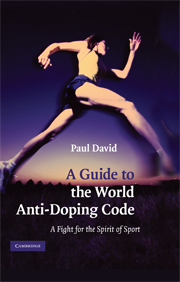Book contents
- Frontmatter
- Contents
- List of figures
- Table of cases
- Introduction
- 1 The development of principles relating to anti-doping regimes: the role of the Court of Arbitration for Sport
- 2 Overview of the Code and the World Anti-Doping Program
- 3 The International Standards in more detail
- 4 The nature of the Code and its interpretation and application
- 5 Articles 1 and 2 of the Code: anti-doping rule violations under the Code
- 6 Article 3 of the Code: the proof of anti-doping rule violations under the Code
- 7 Responsibility for testing and investigations, results management and hearings
- 8 Sanctions for anti-doping rule violations: Articles 9 and 10 of the Code
- 9 Article 13: appeals under the Code
- 10 Challenges to the Code in the courts
- 11 The way ahead: the 2009 Code
- Index
8 - Sanctions for anti-doping rule violations: Articles 9 and 10 of the Code
Published online by Cambridge University Press: 24 June 2009
- Frontmatter
- Contents
- List of figures
- Table of cases
- Introduction
- 1 The development of principles relating to anti-doping regimes: the role of the Court of Arbitration for Sport
- 2 Overview of the Code and the World Anti-Doping Program
- 3 The International Standards in more detail
- 4 The nature of the Code and its interpretation and application
- 5 Articles 1 and 2 of the Code: anti-doping rule violations under the Code
- 6 Article 3 of the Code: the proof of anti-doping rule violations under the Code
- 7 Responsibility for testing and investigations, results management and hearings
- 8 Sanctions for anti-doping rule violations: Articles 9 and 10 of the Code
- 9 Article 13: appeals under the Code
- 10 Challenges to the Code in the courts
- 11 The way ahead: the 2009 Code
- Index
Summary
The Articles dealing with the imposition of sanctions, and the annotations to the Code relevant to those Articles, have received the most attention from national tribunals and CAS. This focus on the possible elimination or reduction of the period of ineligibility laid down by the Code is a natural consequence of a system where the underlying principle is that an athlete will be strictly liable without proof of an intention to cheat, or negligence, or fault, where a prohibited substance or a prohibited method is detected in a bodily sample. As most anti-doping allegations brought under the Code have, to date, related to alleged strict liability violations under Article 2.1, athletes have sought to rely on the provisions providing for the elimination or reduction of the standard period of ineligibility fairly regularly. As has been explained, the scope of any discretion to reduce a fixed sanction by CAS was a matter of uncertainty and of difference between various CAS Panels before the Code. The Code sought to introduce harmony in this important area, by providing for a relatively simple sanctions regime which provided for fixed periods of ineligibility, and contained no provisions for such penalties as fines and suspended periods of ineligibility which were present in many earlier anti-doping regimes.
Articles 9 and 10 of the Code provide for a regime of fixed sanctions, consistent with the Code's central aim of harmonising sanctions across all sports.
- Type
- Chapter
- Information
- A Guide to the World Anti-Doping CodeA Fight for the Spirit of Sport, pp. 165 - 207Publisher: Cambridge University PressPrint publication year: 2008



